ZKsync, highly praised by Vitalik, may truly be undervalued
For a single GPU, ZKsync Airbender not only has the fastest verification speed but also the lowest cost.
For a single GPU, Airbender not only has the fastest verification speed but also the lowest cost.
Written by: Eric, Foresight News
On November 1, Vitalik quoted a tweet from the founder of ZKsync regarding the ZKsync Atlas upgrade and praised ZKsync for doing a lot of "underrated but highly valuable work for the Ethereum ecosystem."
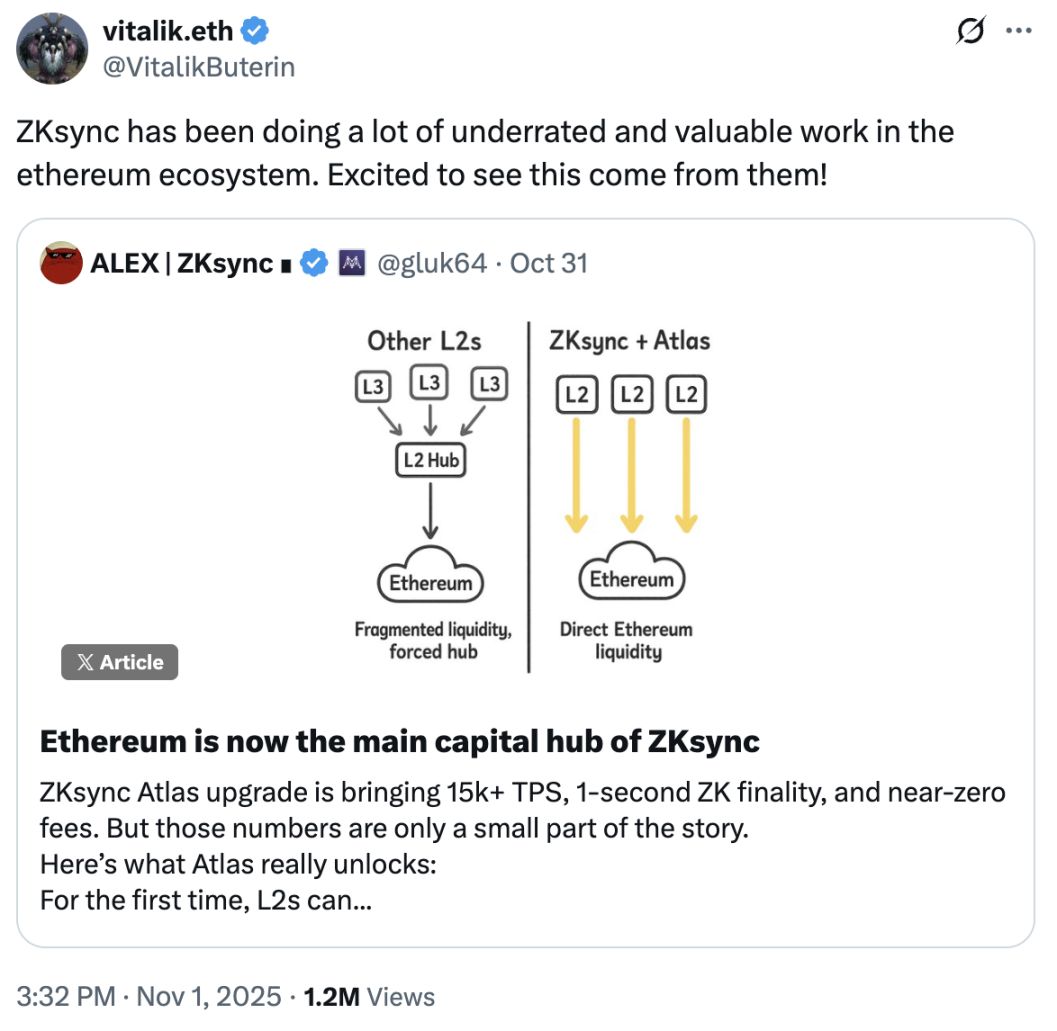
The market quickly reacted to Vitalik's comments, with ZK prices surging more than 2.5 times at their peak over the weekend. Tokens in the ZK ecosystem, including ALT (AltLayer), STRK (Starknet), SCR (Scroll), MINA (Mina), and others, also saw significant gains.
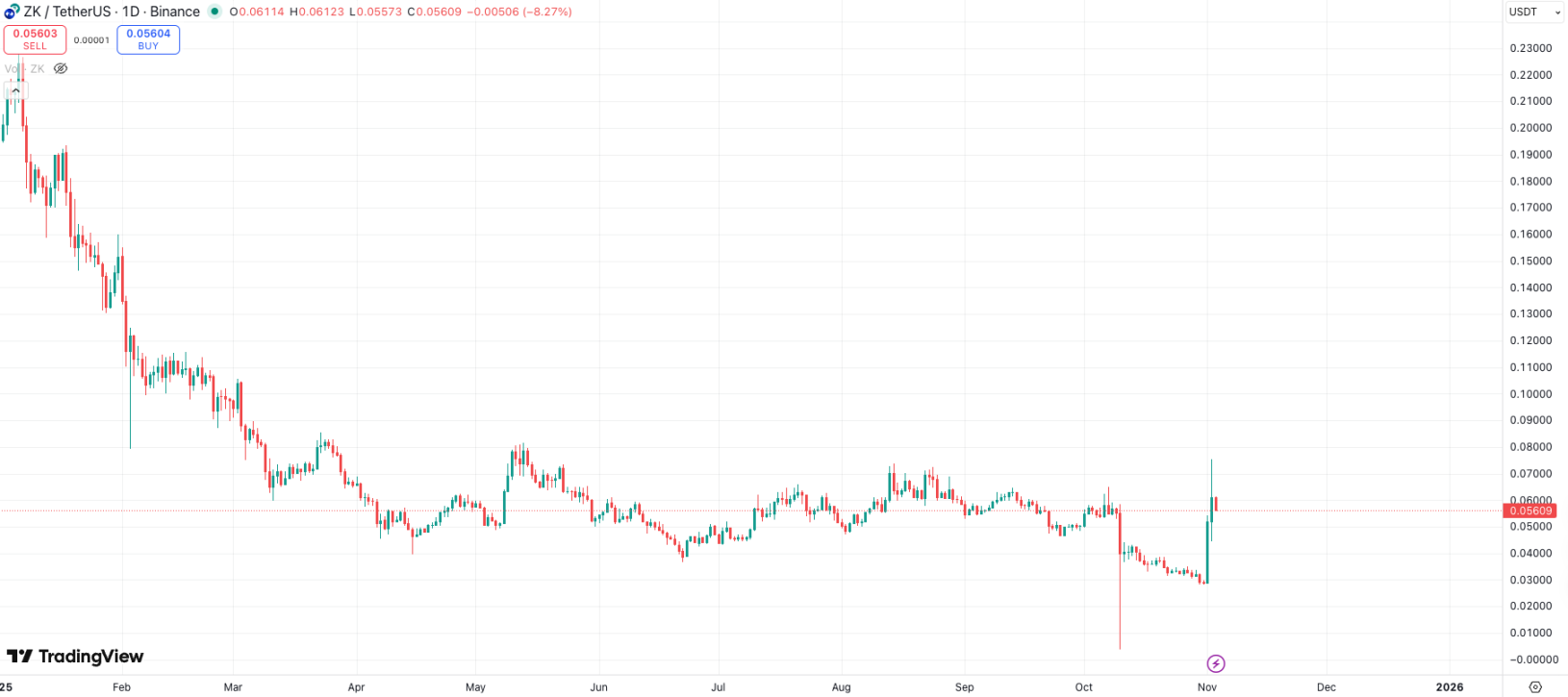
After learning about the ZKsync Atlas upgrade, we found that what ZKsync has accomplished may indeed be underestimated.
Fast, Small but Expensive ZKP
The Ethereum Foundation has promoted ZKP (Zero-Knowledge Proofs) from early on, essentially aiming to solve the problems of slow verification speed and large amounts of verification data.
ZKP is essentially a mathematical probability problem. To give a not entirely accurate example to roughly explain its principle: Suppose someone claims to have solved the "Four Color Theorem." How can we confirm this person has indeed solved it without fully disclosing their solution? The zero-knowledge proof approach is to select some parts of the entire graph and prove that in these parts, no two adjacent regions have the same color. When the number of selected parts reaches a certain value, it can be shown that the probability this person has solved the Four Color Theorem is 99.99...%. At this point, we have proven that they have "indeed solved the Four Color Theorem" without knowing the full details.
This is what people often refer to as "proving something was done without knowing how it was done"—the essence of zero-knowledge proofs. The reason for vigorously promoting ZKP in the Ethereum ecosystem is that, in theory, ZKP's speed ceiling is much higher than that of proving each transaction individually, and the amount of data generated by the proof itself is very small.
The speed advantage comes from the fact that ZKP does not require knowledge of the full picture, only challenges. For example, to verify an Ethereum block, the current method is for each node to verify basic issues such as whether the execution address of each transaction has sufficient balance. But if only one node verifies each transaction using ZKP and then generates a "proof," other nodes only need to verify the reliability of the "proof" itself. More importantly, the data size of this "proof" is very small, so its transmission and verification are extremely fast, and the cost of storing the data is lower.
The reason why this seemingly all-advantageous technology is not widely used is simply because it is too expensive.
Although ZKP does not require reproducing all processes, the challenge itself consumes a lot of computing power. If you stack GPUs like in the AI arms race, you can achieve faster speeds, but not everyone can afford such costs. However, if algorithmic and engineering innovations can reduce the required computing power and the time to generate proofs under low computing power to a certain level, achieving a balance between "price increases driven by more applications introduced through technological innovation" and "the cost of setting up nodes and purchasing GPUs" for Ethereum, then this becomes a worthwhile endeavor.
Therefore, many ZK concept projects or open-source developers in the Ethereum ecosystem focus on generating ZK proofs at lower costs and faster speeds under low costs. Not long ago, the Brevis team achieved an average of 6.9 seconds to prove an Ethereum block (99.6% of proof times were less than the current Ethereum block time: within 12 seconds) using only half the cost (64 RTX 5090 GPUs) of the SP1 Hypercube solution. This achievement earned collective praise from the Ethereum community for this very reason.
Although GPU costs still exceed $100,000, at least the proof speed has dropped to the current level without ZKP. The next task for everyone is to reduce the cost.
The Atlas Upgrade Achieves 1-Second ZK Finality
Perhaps many people don't know that ZKsync's open-source zkVM, ZKsync Airbender, is the fastest zkVM for single GPU verification. According to Ethproofs data, using a single 4090, ZKsync Airbender's average verification time is 51 seconds, with a cost of less than one cent—both are the best results among zkVMs.
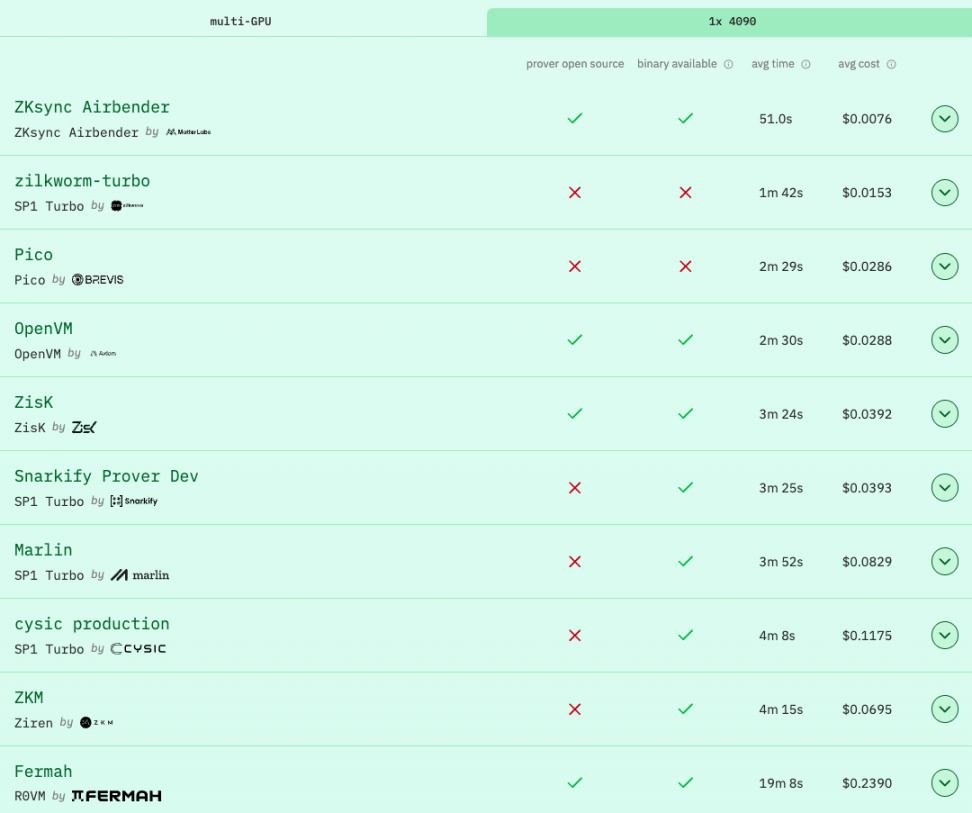
According to data provided by ZKsync itself, excluding recursion, Airbender uses a single H100 and the ZKsync OS storage model to verify the Ethereum mainnet with an average time of 17 seconds. Even including recursion, the total average time is only about 35 seconds. ZKsync believes this is much better than needing dozens of GPUs to achieve verification within 12 seconds. However, since there is currently only data for two GPUs with an average of 22.2 seconds, the actual performance is yet to be determined.
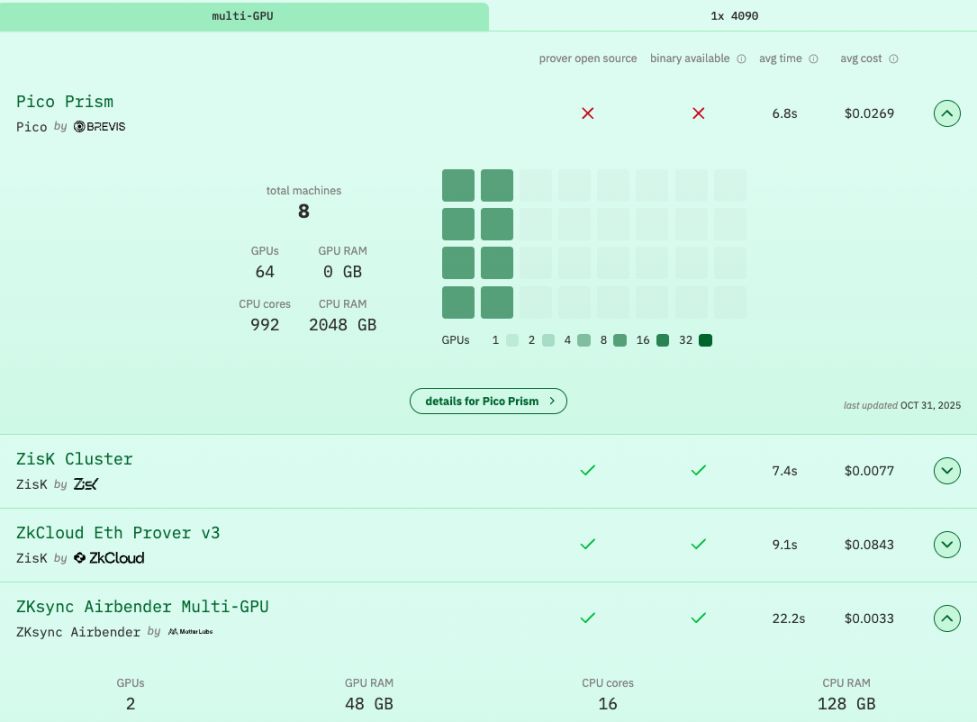
All of this is not solely due to Airbender; algorithmic and engineering optimizations are only part of the story. The deep integration with the ZKsync tech stack is the key to maximizing results. More importantly, it demonstrates that real-time proof of the Ethereum mainnet using a single GPU is possible.
At the end of June, ZKsync launched Airbender, and on the penultimate day of the National Day holiday, the Atlas upgrade went live. This upgrade, which integrated Airbender, significantly improved ZKsync's throughput, confirmation speed, and cost.
In terms of throughput, ZKsync optimized the sequencer at the engineering level: by using independent asynchronous components to minimize the overhead caused by synchronization; separating the state required by the virtual machine, the state required by the API, and the state required to generate or verify zero-knowledge proofs on L1, thereby reducing unnecessary component overhead.
According to ZKsync's field tests, TPS for high-frequency price updates, stablecoin transfers in payment scenarios, and native ETH transfers reached 23k, 15k, and 43k, respectively.
Another huge qualitative leap comes from Airbender, which helped ZKsync achieve 1-second block confirmation and a single transfer cost of $0.0001. Unlike verifying mainnet blocks, ZKsync only verifies the validity of state transitions, so the computation is much less than verifying mainnet blocks. Although transactions with ZK finality still require mainnet verification to achieve L1 finality, ZK verification already confirms the validity of the transaction, and L1 finality is more of a procedural guarantee.
In other words, transactions executed on ZKsync only need ZKP verification to be fully confirmed as valid, and with the greatly reduced cost, ZKsync has achieved, in their own words, application scenarios that only Airbender can bring:
First, naturally, are applications such as on-chain order books, payment systems, exchanges, and automated market makers. Airbender enables the system to verify and settle at extremely fast speeds, reducing the risk of rollbacks for these on-chain applications.
The second point is something that many current L2s cannot achieve: supporting interoperability between public and private systems (such as ZKsync's Prividiums) without third parties. Prividiums is ZKsync's infrastructure to help enterprises build private chains. For enterprises, the requirements for blockchain are fast settlement and privacy. Fast settlement needs no further explanation, and the inherent privacy of ZKP allows enterprise private chains to verify transaction validity when interoperating with public chains without exposing the ledger information of the chain itself. The combination of the two even meets the settlement time requirements for on-chain securities and forex trading in compliance regulations.
This may also be why ZKsync has become the second-largest tokenized RWA asset issuance network after Ethereum.
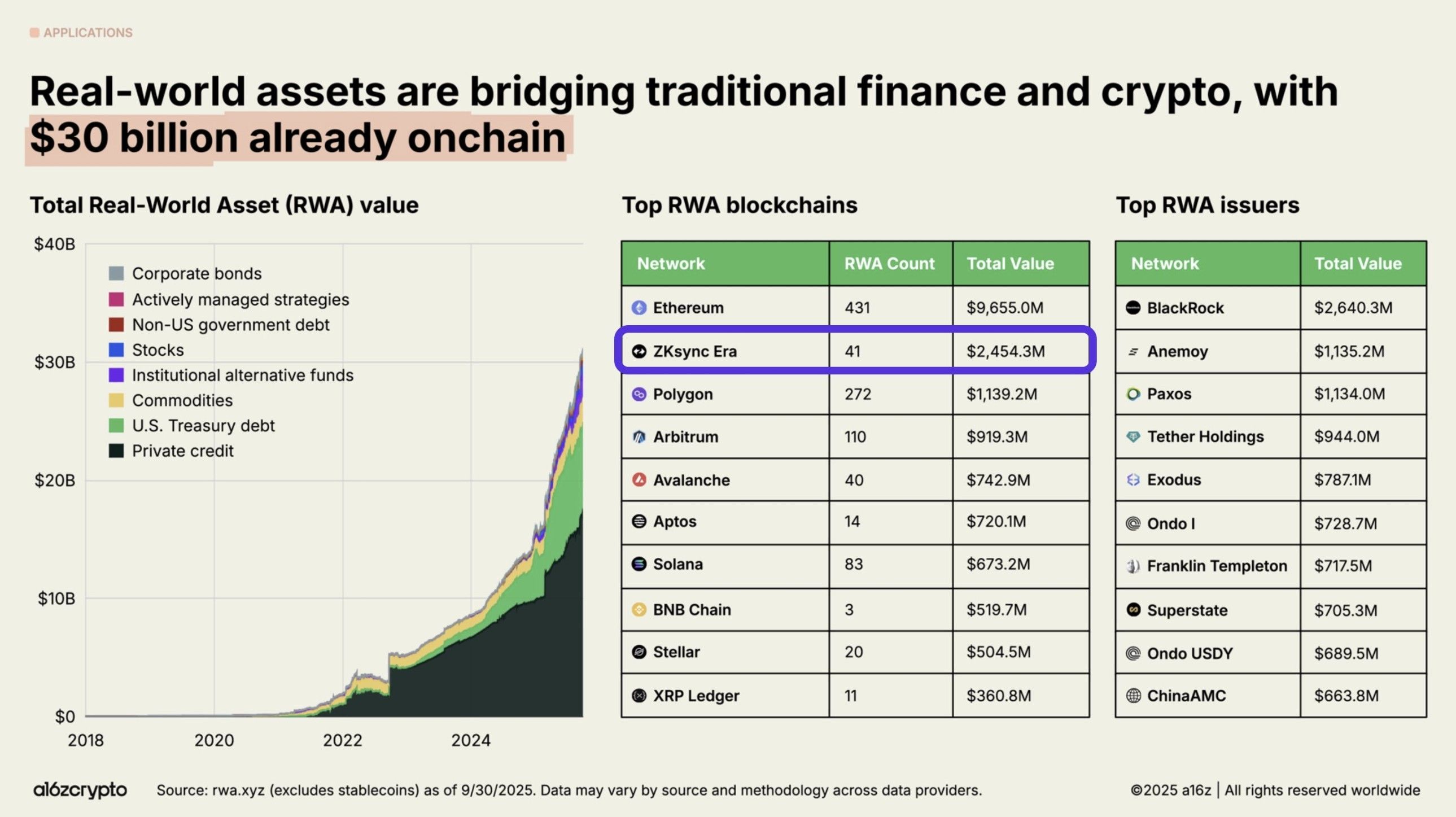
ZKsync is also proud to state that all of this is only possible under the Atlas upgrade: the sequencer provides low-latency transaction packaging, Airbender generates proofs within one second, and the Gateway verifies and coordinates cross-chain messages.
Bridging L1 and L2
As Vitalik retweeted in this tweet, ZKsync founder Alex believes that after the Atlas upgrade, ZKsync has truly bridged to the Ethereum mainnet.
Now, ZKsync's transaction final confirmation time (about 1 second) is shorter than the Ethereum mainnet block time (average 12 seconds), which means that institutional and RWA transactions conducted on ZKsync are essentially the same as those on the Ethereum mainnet, just waiting for mainnet confirmation. This means ZKsync does not need to repeatedly establish liquidity centers on L2; it can directly use mainnet liquidity. This is because ZK Rollup's cross-chain mechanism with the mainnet does not require a 7-day challenge period like OP Rollup, and the Atlas upgrade further accelerates the process.
This improves the L2 fragmentation issue recently discussed in the Ethereum community. L2 and L1 are no longer two separate chains but are connected as one through rapid confirmation and verification. For the first time, L2 can truly be called a "scaling network."
Recall when ZKsync and Scroll first launched on mainnet, transaction confirmation speed and gas fees were the same as or even higher than the mainnet. This was essentially because there had not yet been systematic algorithmic and engineering optimizations for ZKP, resulting in slow verification and high costs, which at the time even triggered a trust crisis for ZK Rollup. Today, Optimism and Arbitrum are gradually transitioning from OP Rollup to ZK Rollup (or a combination of both), and the further improvements in cost and speed by ZKsync and other ZK Rollups, as well as Scroll's decentralized ZKP, have turned what was once considered "nonsense" into something worth looking forward to.
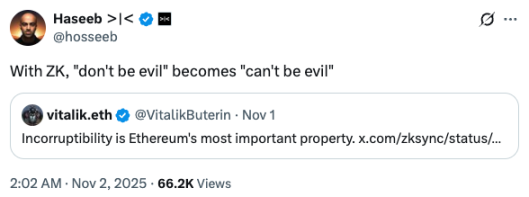
From being criticized by everyone to becoming highly sought after, ZK has ushered in a new dawn. After the sequencer and cross-chain bridge multisig are fully decentralized, perhaps the "can't be evil" vision described by Dragonfly Managing Partner Hasseb Qureshi can truly be realized.
Disclaimer: The content of this article solely reflects the author's opinion and does not represent the platform in any capacity. This article is not intended to serve as a reference for making investment decisions.
You may also like
XRP ETF net inflows continue to rise, but on-chain performance remains concerning!
ZEC Whale Withdrawal: The $88 Million Signal Shaking Crypto Markets
Federal Reserve policy triggers risk aversion—can Bitcoin make a comeback?
Autumn stress test for the crypto market: A correction or a new market paradigm
